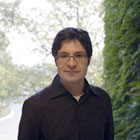Tag: Life Sciences
-
Health
Sleep found to repair and reorganize the brain
Most of us do it every night but we don’t know why. If you miss too many nights, it might kill you. We know why we eat, drink, breathe, and move around, but no one can explain why we need to sleep. What does seven or eight hours of snoozing really do for us? Van…
-
Campus & Community
Broad receives $100M gift to launch research center
The Stanley Medical Research Institute today announced a $100 million gift to the Broad Institute of MIT and Harvard to launch a new research center that will combine the strengths of genomics and chemical biology to advance the understanding and treatment of severe mental illnesses.
-
Health
Despite their heft, many dinosaurs had surprisingly tiny genomes
They might be giants, but many dinosaurs apparently had genomes no larger than those of a modern hummingbird. So say scientists who’ve linked bone cell and genome size among living species and then used that new understanding to gauge the genome sizes of 31 species of extinct dinosaurs and birds, whose bone cells can be…
-
Health
I know just how you feel
When people talk with psychotherapists, the best results occur if both feel similar emotions, when both “like” each other. But do most therapists really connect with patients this way? No one has ever tried to directly measure the biology of empathy between the two.
-
Health
Seeing the forest, from the trees
Alain Houle thinks higher-status chimpanzees likely feed on more, higher-quality fruit — found higher up in the tree — than lower-status chimpanzees, which leads to the chimps being in better physical shape and greater breeding success. “I thought I’d be killed,” Houle said later. “They climbed up, looked at me, barked at me, and then…
-
Health
New findings may increase longevity of stem cells
Identifying the mechanisms that control cell life span is one of the more important questions facing stem cell researchers, indeed, all researchers attempting to understand normal and abnormal cell and organ development. So the recent discovery by a Harvard Stem Cell Institute team that a family of well-known transcription factors plays a major role in…
-
Health
Spray-dry vaccine for TB developed
Bioengineers and public health researchers have developed a novel spray-drying method for preserving and delivering the most common tuberculosis (TB) vaccine. The low-cost and scalable technique offers several potential advantages over conventional freezing procedures, such as greater stability at room temperature and use in needle-free delivery. The spray-drying process could one day provide a better…
-
Health
Orangutan research yields conservation dividends
The population of the orangutan, one of humankind’s closest animal relatives, has declined with human expansion. The orangutan population declined by 97 percent in the 20th century and over 90 percent of their rainforest habitat has been destroyed. The factors contributing to that decline – illegal logging, conversion of forestland to agriculture, and hunting to…
-
Health
Saving your self from yourself
“Your gut is a complicated place,” notes Shannon Turley, an assistant professor of pathology at Harvard Medical School. In addition to processing food three or more times a day, an intestine needs to protect you from being damaged by yourself.
-
Campus & Community
Elkan Blout, former HSPH academic affairs dean, 87
Elkan Blout, a former dean for academic affairs at the Harvard School of Public Health (HSPH), National Medal of Science winner, and a leading contributor to the development of instant film, died on Dec. 20, 2006, at Brigham and Women’s Hospital. The cause was pneumonia. He was 87.
-
Campus & Community
Two from Harvard win science medals
The National Academy of Sciences (NAS) will honor 18 individuals, including two Harvard researchers, for their fundamental contributions to human knowledge. Harvard’s award recipients are Randy Lee Buckner, professor of psychology, and Richard M. Losick, Maria Moors Cabot Professor of Biology.
-
Health
Big brains better for birds
As you might guess, big-brained birds survive better in the wild than those less cerebral for their size. Scientists guessed that too, but they had to prove it to themselves.
-
Health
Mystery muscles make mightier mice
Scientists have muscled in on a genetic switch that allows mice to run longer and faster. Humans possess the same switch, so the discovery might open new paths to treating muscle-wasting diseases and building better bodies.
-
Health
World’s largest flower evolved from family of much tinier blooms
The plant with the world’s largest flower – typically a full meter across, with a bud the size of a basketball – evolved from a family of plants whose blossoms are nearly all tiny, botanists write this week in the journal Science. Their genetic analysis of rafflesia reveals that it is closely related to a…
-
Campus & Community
Harvard creates new, University-wide committee to guide interdisciplinary efforts in science
The Harvard Corporation has authorized the establishment of a new, University-wide standing committee on science and engineering to guide the University into a new era of collaborative, cross-disciplinary science initiatives. The Corporation also created a $50 million fund to provide initial support for the committee’s work, pending the submission of a budget by the committee.
-
Campus & Community
Women far behind in patent awards
Women who strive to make new biological discoveries at universities are awarded less than half the number of patents than their male colleagues.



